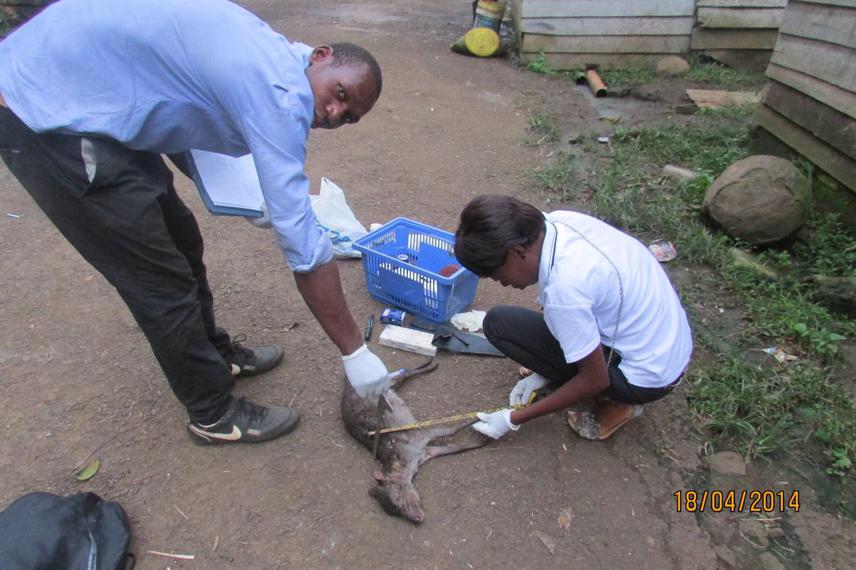Maria Grande Vega
Other projects
6 Jul 2009
Balancing Local Population Nutrition Demands with Conservation of Wildlife in the Pico Basile Region, Bioko Island
We will study the reproductive biology of 4 heavily hunted mammals of Bioko Island and we will continue collecting data on extraction rates and on hunting effort, in order to aid sustainable hunting.

Ambrosio Ondo (Field assistant) and Josefa Mikue (UNGE student).
This study aims to provide information on the reproductive biology of four taxa [two ungulates, Ogilbyi’s duiker (Cephalophus ogilbyi), blue duiker (Philantomba monticola), and two large rodents, brush-tailed porcupine (Atherurus africanus), giant pouched rat (Cricetomys emini)] in Bioko Island, Equatorial Guinea. Such basic information is critical for the development of sustainable hunting strategies. We will also continue collecting data on extraction rates and on hunting effort. With all these data we aim to assist in understanding the impact of the bushmeat trade on these species and recommend ways of encouraging sustainable hunting. This study will feed directly to the current project of the Ministry of Fisheries and Environment (GEF-project) in which one of the objectives is to draw up a management plan for the Pico Basilé National Park.
Another major outcome of the project is to train students and faculty members from the local university on fauna study techniques and further their knowledge of biodiversity conservation in the country.
Activities and Methodology
Species extraction rates and hunting effort data
Two local field assistants, one of Basilé Fang and other of Basilé Bubi (two villages with similar characteristics in terms of access to the capital Malabo and to the Pico Basilé National Park, but the first one made up of subsistence hunters and the second one of commercial hunters) will record, for one year long, all animals hunted or traded in each village, from daily information supplied by hunters or traders (specie hunted, hunter, method used, area of hunting, price, buyer, final destination and final price). They will also ask the hunter when (day and approximate time he left the village) and when he returned from his hunting trip to determine hunting effort.
Reproductive cycles’ data
Collection of reproductive systems will be carried out by our assistant in Basilé Fang for a whole year; from animals hunted (adults and sub-adults) in the village to sell as cooked meals in the bars. They will be labelled separate and stored in containers containing a 10% formalin solution. Then containers will be taken to The National University for their analysis with the students. We will measure the average number of foetuses per birth per pregnant female, foetal sex ratio, productivity and patterns of conceptions and births. We will analyse whether conceptions and births in Bioko are seasonal or a seasonal. We will also compare reproductive synchronicity among the four species within the study area.